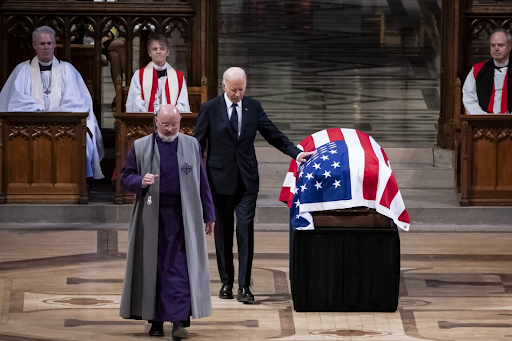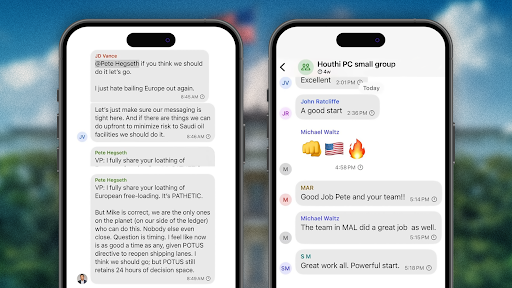On December 29th, 2024, Jimmy Carter, 39th President of the United States, passed away surrounded by family members in Plains, Georgia. Carter died at the age of 100 officially holding the title of the longest life span of any President.
Family members, political leaders, and friends attended his funeral to honor his legacy and remember the fulfilling life he lived on January 9th, 2025 at the Washington National Cathedral. The funeral was officiated by the current bishop of the Episcopal church, along with the Bishop of Washington and the Dean of the Cathedral.
Among those who attended were Presidents Joe Biden, Barack Obama, George W. Bush, Donald Trump, Bill Clinton and former Secretary of State Hillary Clinton, Vice-Presidents Kamala Harris, JD Vance, Mike Pence, First Ladies Melania Trump and Laura Bush, and Second Gentleman Douglas Emhoff.
President Joe Biden delivered a eulogy to Carter recalling his first time at the Carter house in Plains, Georgia. He reflected on Carter’s friendship and personable character. He stated, “Throughout his [Carter’s] life, he showed us what it means to be a practitioner of good works and a good and faithful servant of God and of the people.”
Biden also said, “Jill and I will cherish our visits with them, including that last one in their home. We saw Jimmy as he always was, at peace with a life fully lived. A good life of purpose and meaning, of character driven by destiny and filled with the power of faith, hope and love” (AP News).
Throughout Jimmy Carter’s life, he outlined what it meant to be a political voice, a leader, and a true and genuine soul to the entire world. History teacher at Ramapo High School, Ms. Sibilia states, “Carter’s post-presidential humanitarian efforts redefine his legacy, the narrative of moral and religious leadership, the struggles of governing during uncertain times, and the lasting impact of character in public service.”
Born on October 1st, 1924, in Plains, Georgia, Carter grew up developing a strong work ethic surrounded by farm life. He later attended the U.S. Naval Academy, and graduated in 1946. Carter served as a naval officer, and he also worked on nuclear submarine technology.
In 1963, Carter stepped foot into the political realm and served in the Georgia State Senate from 1963 to 1967, later becoming the Governor of Georgia. He focused on desegregation, environmental issues, and government efficiency which became the primary baseline of his presidency when he won against his opponent Gerald Ford in 1976.
Jimmy Carter and Gerald Ford became good friends who respected each other after their political rivalry during the 1976 presidential election. They left impactful marks on each others’ lives and they became so close that they agreed to write a eulogy for the other to read at their funerals. The only question was, who would be the one to deliver it in person? When Ford died in 2006, Carter upheld his end of the promise and delivered his eulogy to Gerald Ford.
At Jimmy Carter’s funeral on January 9th, Gerald Ford’s son Steven delivered the written eulogy posthumously. Steven Ford delivered Gerald’s words: “May god bless and watch over this good man. May he grant peace to the Carter family as they say goodbye to a man whose life was lived to the fullest. With the faith demonstrated in countless good works, with the mission richly fulfilled, and a soul rewarded with everlasting life. As for myself Jimmy, I’m looking forward to our reunion, we have much to catch up on. Thank you Mr. President, and welcome home, old friend” (PBS News).
Lana Jepsen, a junior at Ramapo High School states, “Jimmy Carter shaped more than just politics. He won a Nobel Peace Prize for advocating for human rights and working for social welfare. He will definitely be remembered across not just the United States, but also the world, and I think that’s a great thing.”
After his time in office, Carter fully turned his focus on becoming a global humanitarian and advocate for world peace in many different ways. He wrote so many books that covered so many topics. Jonathan Karp, president and CEO of Simon & Schuster, told Publisher’s Weekly, “President Carter wrote memoirs, calls to action, fiction, poetry, and children’s books. He wrote appreciations of Scripture and nature. He offered advice on how to live a meaningful life. He delighted in reading the audiobook versions of his work, for which he won three Grammy awards. In all of his books, he maintained a voice of great integrity and intellectual honesty.” He made a lasting impact on the world of literacy in addition to politics. He co-founded the Carter Center in 1982 which focused on restoring human rights, promoting democracy and advocating for public health. In 2002, Carter was awarded the Nobel Peace Prize for his humanitarian work and noteworthy accomplishments.
Carter also managed to have great influence on international policy during his time in the political realm. He played a role in negotiating the Camp David Accords in 1987, which led to a peace treaty between Israel and Egypt. Carter also oversaw the Panama Canal Treaties, also known as the Torrijos-Carter Treaties, transferring control of the canal to the nation of Panama (history.state.gov).
Carter also dealt with a lot of conflicts through international affairs. During his presidency the Iran Hostage Crisis began in 1979 where 52 American diplomats and citizens were taken hostage at the U.S. embassy in Tehran. While this was a major setback that impacted his presidency, he successfully secured the hostages’ release on his final day in office.
Carter was a resilient president and political leader who devoted his life to the people and the betterment of his country. Ms. Sibilia adds, “Jimmy Carter’s presidency is always fascinating, a lesson on leadership, resilience, and the challenges of navigating a complex political and global landscape. His time in office, from 1977 to 1981, highlights critical issues such as energy policy, environmental conservation, human rights diplomacy, and economic challenges like inflation.”
Jimmy Carter’s life portrayed genuine compassion and dedication to the greater good. His legacy constantly reminds the world of the power of public service and the importance of being a strong leader. His life’s work extended beyond his term as president leaving a lasting mark on lives around the world that will be remembered and celebrated.






